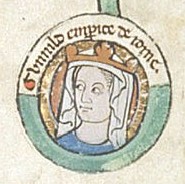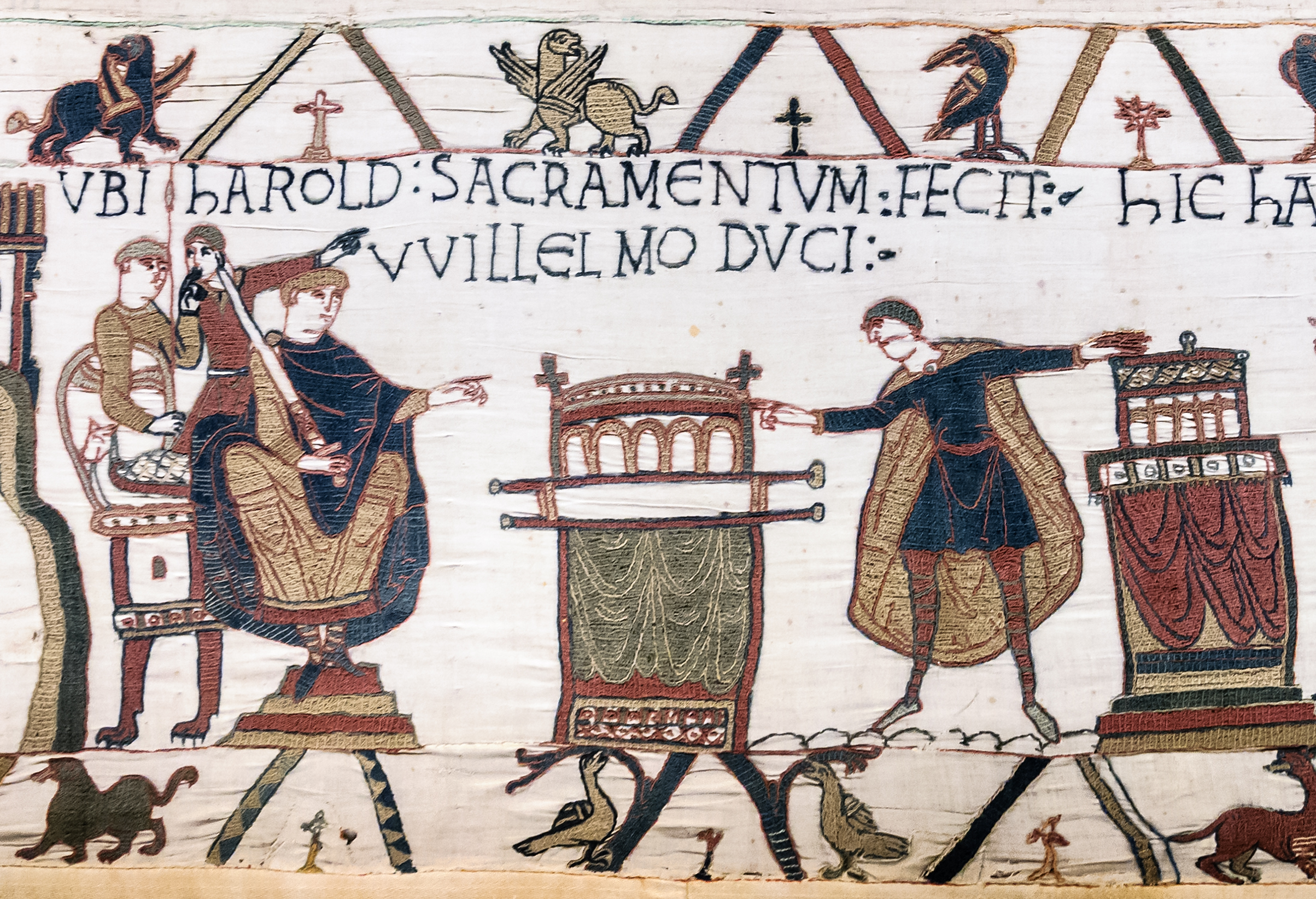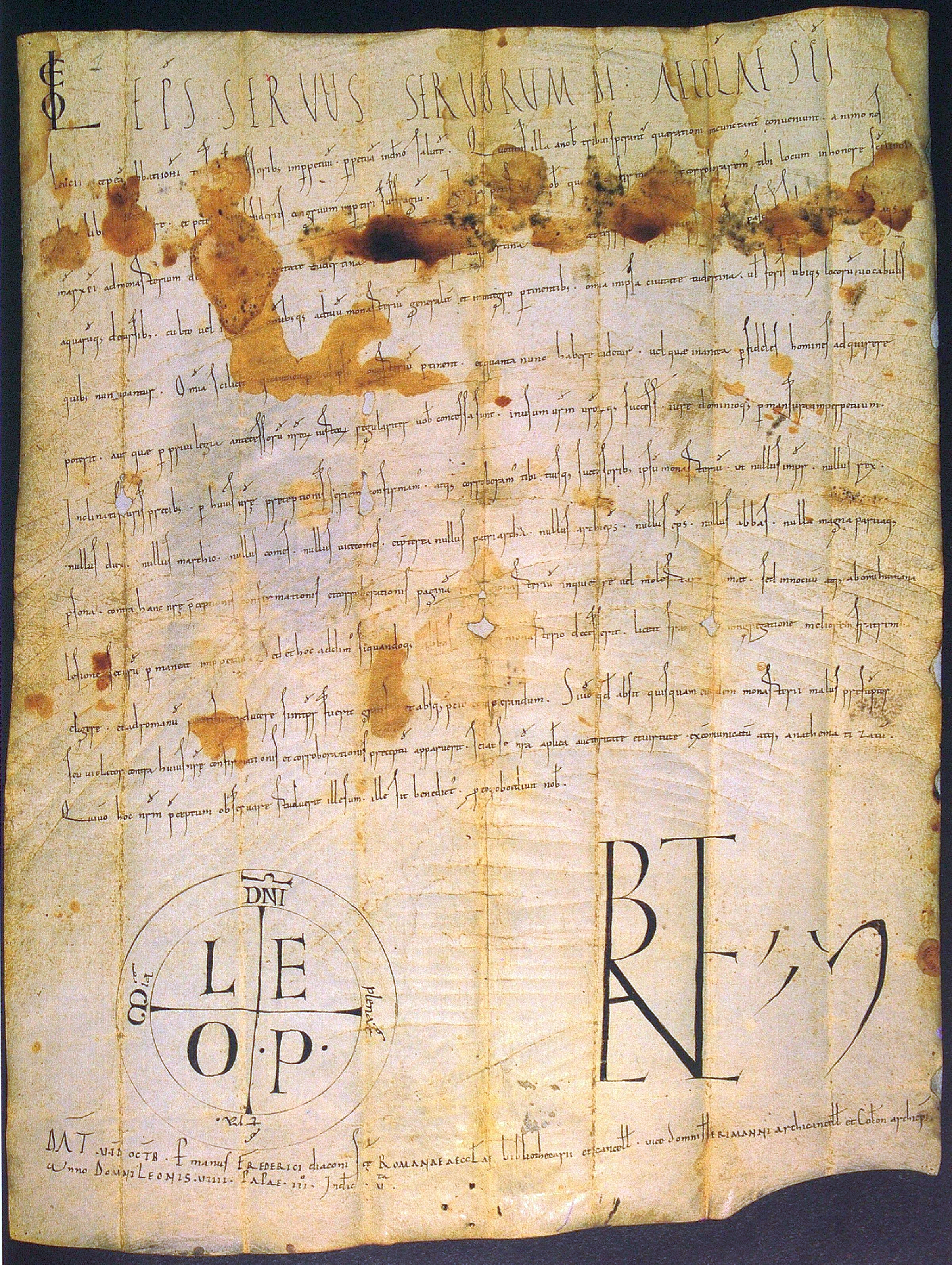|
1053
Year 1053 ( MLIII) was a common year starting on Friday (link will display the full calendar) of the Julian calendar. Events By place Byzantine Empire * End of the Pecheneg Revolt: Emperor Constantine IX Monomachos makes peace with the Pechenegs. However, Pecheneg raids do not cease; they not only damage the economy by plundering, but Constantine is also forced to buy protection or peace from them by gifts, land grants, privileges and titles. Europe * June 18 – Battle of Civitate: Norman horsemen (3,000 men), led by Humphrey of Hauteville, count of Apulia and Calabria, rout the combined forces under Pope Leo IX, in Southern Italy. The Normans destroy the allied Papal army and capture Leo, who is imprisoned (as a hostage for 8 months) in Benevento. * December – Conrad I, duke of Bavaria, is summoned to a Christmas court at Merseburg, and deposed by Emperor Henry III. He flees to King Andrew I in Hungary, and joins a coalition with the rebellious Welf ... [...More Info...] [...Related Items...] OR: [Wikipedia] [Google] [Baidu] |
Godwin, Earl Of Wessex
Godwin of Wessex ( ang, Godwine; – 15 April 1053) was an English nobleman who became one of the most powerful earls in Kingdom of England, England under the Denmark, Danish king Cnut the Great (King of England from 1016 to 1035) and his successors. Cnut made Godwin the first Earl of Wessex (). Godwin was the father of King Harold Godwinson, Harold II () and of Edith of Wessex, who in 1045 married King Edward the Confessor (). Rise to power Godwin was born , likely in Sussex. Godwin's father was probably Wulfnoth Cild, who was a thegn of Kingdom of Sussex, Sussex. His origin is unknown but 'Child' (also written Cild) is cognate with 'the Younger' or 'Junior' and as today associated with some form of inheritance. In 1009 Wulfnoth was accused of unknown crimes at a muster of Æthelred the Unready's fleet and fled with twenty ships; the ships sent to pursue him were destroyed in a storm. Godwin was probably an adherent of Æthelred's eldest son, Æthelstan Ætheling, Æthelstan, ... [...More Info...] [...Related Items...] OR: [Wikipedia] [Google] [Baidu] |
Battle Of Civitate
The Battle of Civitate was fought on 18 June 1053 in southern Italy, between the Normans, led by the Count of Apulia Humphrey of Hauteville, and a Swabian-Italian- Lombard army, organised by Pope Leo IX and led on the battlefield by Gerard, Duke of Lorraine, and Rudolf, Prince of Benevento. The Norman victory over the allied papal army marked the climax of a conflict between the Norman mercenaries who came to southern Italy in the eleventh century, the de Hauteville family, and the local Lombard princes. By 1059 the Normans would create an alliance with the papacy, which included a formal recognition by Pope Nicholas II of the Norman conquest in south Italy, investing Robert Guiscard as Duke of Apulia and Calabria, and Count of Sicily. Background The arrival of the Normans in Italy The Normans had arrived in Southern Italy in 1017, in a pilgrimage to the sanctuary of St. Michael Archangel in Monte Sant'Angelo sul Gargano (Apulia). These warriors had been used to counter the ... [...More Info...] [...Related Items...] OR: [Wikipedia] [Google] [Baidu] |
Henry III, Holy Roman Emperor
Henry III (28 October 1016 – 5 October 1056), called the Black or the Pious, was Holy Roman Emperor from 1046 until his death in 1056. A member of the Salian dynasty, he was the eldest son of Conrad II and Gisela of Swabia. Henry was raised by his father, who made him Duke of Bavaria in 1026, appointed him co-ruler in 1028 and bestowed him with the duchy of Swabia and the Kingdom of Burgundy ten years later in 1038. The emperor's death the following year ended a remarkably smooth and harmonious transition process towards Henry's sovereign rule, that was rather uncharacteristic for the Ottonian and Salian monarchs. Henry succeeded Conrad II as Duke of Carinthia and King of Italy and continued to pursue his father's political course on the basis of ''virtus et probitas'' (courage and honesty), which led to an unprecedented sacral exaltation of the kingship. In 1046 Henry ended the papal schism, was crowned Emperor by Pope Clement II, freed the Vatican from dependence on the Roma ... [...More Info...] [...Related Items...] OR: [Wikipedia] [Google] [Baidu] |
Harold Godwinson
Harold Godwinson ( – 14 October 1066), also called Harold II, was the last crowned Anglo-Saxon English king. Harold reigned from 6 January 1066 until his death at the Battle of Hastings, fighting the Norman invaders led by William the Conqueror during the Norman conquest of England. His death marked the end of Anglo-Saxon rule over England. Harold Godwinson was a member of a prominent Anglo-Saxon family with ties to Cnut the Great. He became a powerful earl after the death of his father, Godwin, Earl of Wessex. After his brother-in-law, King Edward the Confessor, died without an heir on 5 January 1066, the ''Witenagemot'' convened and chose Harold to succeed him; he was probably the first English monarch to be crowned in Westminster Abbey. In late September, he successfully repelled an invasion by rival claimant Harald Hardrada of Norway in York before marching his army back south to meet William the Conqueror at Hastings two weeks later. Family background Harold ... [...More Info...] [...Related Items...] OR: [Wikipedia] [Google] [Baidu] |
Andrew I Of Hungary
Andrew I the White or the Catholic ( hu, I. Fehér or ; 1015 – before 6 December 1060) was King of Hungary from 1046 to 1060. He descended from a younger branch of the Árpád dynasty. After spending fifteen years in exile, he ascended the throne during an extensive revolt of the pagan Hungarians. He strengthened the position of Christianity in the Kingdom of Hungary and successfully defended its independence against the Holy Roman Empire. His efforts to ensure the succession of his son, Solomon, King of Hungary, Solomon, resulted in the open revolt of his brother, Béla I of Hungary, Béla. Béla dethroned Andrew by force in 1060. Andrew suffered severe injuries during the fighting and died before his brother was crowned king. Early life Childhood (c. 1015–1031) Medieval sources provide Vazul#Family, two contradictory reports of the parents of Andrew, and his two brothers, Levente and Béla I of Hungary, Béla. For instance, the ''Chronicle of Zagreb'' and ''Saint ... [...More Info...] [...Related Items...] OR: [Wikipedia] [Google] [Baidu] |
Pope Leo IX
Pope Leo IX (21 June 1002 – 19 April 1054), born Bruno von Egisheim-Dagsburg, was the head of the Catholic Church and ruler of the Papal States from 12 February 1049 to his death in 1054. Leo IX is considered to be one of the most historically significant popes of the Middle Ages; he was instrumental in the precipitation of the Great Schism of 1054, considered the turning point in which the Catholic and Eastern Orthodox Churches formally separated. He is venerated as a saint in the Catholic Church. Leo IX favored traditional morality in his reformation of the Catholic Church. One of his first public acts was to hold the Easter synod of 1049; he joined Emperor Henry III in Saxony and accompanied him to Cologne and Aachen. He also summoned a meeting of the higher clergy in Reims in which several important reforming decrees were passed. At Mainz he held a council at which the Italian and French as well as the German clergy were represented, and ambassadors of the Byzantine emperor ... [...More Info...] [...Related Items...] OR: [Wikipedia] [Google] [Baidu] |
Conrad I, Duke Of Bavaria
Conrad I ( 1020 – 5 December 1055), also known as Cuno or Kuno, was the duke of Bavaria from 1049 to 1053. He was of the Ezzonen family, his parents being Liudolf, Count of Zütphen and eldest son of Ezzo, Count Palatine of Lorraine, and Matilda. For this, he is sometimes called ''Conrad of Zutphen''. After eighteen months of vacancy since the death of Henry VII, the duchy of Bavaria was filled on 2 February 1049 by the Emperor Henry III with Cuno. Cuno was the possible successor of the childless emperor. He was not the choice of the Bavarian nobility, but was intended to draw the duchy closer to the crown. This failed, for Cuno married against the will of the emperor when he wed Judith of Schweinfurt, daughter of Otto III, Duke of Swabia. He tried to increase his power in Bavaria and was in conflict with Gebhard III, Bishop of Regensburg. Finally, he was summoned to a Christmas court at Merseburg in 1052–1053 and there deposed. He was replaced early the next year by Henry's ... [...More Info...] [...Related Items...] OR: [Wikipedia] [Google] [Baidu] |
Benevento
Benevento (, , ; la, Beneventum) is a city and ''comune'' of Campania, Italy, capital of the province of Benevento, northeast of Naples. It is situated on a hill above sea level at the confluence of the Calore Irpino (or Beneventano) and the Sabato. In 2020, Benevento has 58,418 inhabitants. It is also the seat of a Catholic archbishop. Benevento occupies the site of the ancient Beneventum, originally Maleventum or even earlier Maloenton. The meaning of the name of the town is evidenced by its former Latin name, translating as good or fair wind. In the imperial period it was supposed to have been founded by Diomedes after the Trojan War. Due to its artistic and cultural significance, the Santa Sofia Church in Benevento was declared a UNESCO World Heritage Site in 2011, as part of a group of seven historic buildings inscribed as Longobards in Italy, Places of Power (568–774 A.D.). A patron saint of Benevento is Saint Bartholomew, the Apostle, whose relics are kept ther ... [...More Info...] [...Related Items...] OR: [Wikipedia] [Google] [Baidu] |
Edward The Confessor
Edward the Confessor ; la, Eduardus Confessor , ; ( 1003 – 5 January 1066) was one of the last Anglo-Saxon English kings. Usually considered the last king of the House of Wessex, he ruled from 1042 to 1066. Edward was the son of Æthelred the Unready and Emma of Normandy. He succeeded Cnut the Great's son – and his own half-brother – Harthacnut. He restored the rule of the House of Wessex after the period of Danish rule since Cnut conquered England in 1016. When Edward died in 1066, he was succeeded by his wife's brother Harold Godwinson, who was defeated and killed in the same year by the Normans under William the Conqueror at the Battle of Hastings. Edward's young great-nephew Edgar the Ætheling of the House of Wessex was proclaimed king after the Battle of Hastings in 1066 but was never crowned and was peacefully deposed after about eight weeks. Historians disagree about Edward's fairly long 24-year reign. His nickname reflects the traditional image ... [...More Info...] [...Related Items...] OR: [Wikipedia] [Google] [Baidu] |
June 18
Events Pre-1600 * 618 – Li Yuan becomes Emperor Gaozu of Tang, initiating three centuries of Tang dynasty rule over China. * 656 – Ali becomes Caliph of the Rashidun Caliphate. * 860 – Byzantine–Rus' War: A fleet of about 200 Rus' vessels sails into the Bosphorus and starts pillaging the suburbs of the Byzantine capital Constantinople. *1053 – Battle of Civitate: Three thousand Norman horsemen of Count Humphrey rout the troops of Pope Leo IX. *1178 – Five Canterbury monks see an event believed to have been the formation of the Giordano Bruno crater on the moon. It is believed that the current oscillations of the Moon's distance from the Earth (on the order of meters) are a result of this collision. * 1264 – The Parliament of Ireland meets at Castledermot in County Kildare, the first definitively known meeting of this Irish legislature. * 1265 – A draft Byzantine–Venetian treaty is concluded between Venetian envoys and Empero ... [...More Info...] [...Related Items...] OR: [Wikipedia] [Google] [Baidu] |
Henry IV, Holy Roman Emperor
Henry IV (german: Heinrich IV; 11 November 1050 – 7 August 1106) was Holy Roman Emperor from 1084 to 1105, King of Germany from 1054 to 1105, King of Italy and Burgundy from 1056 to 1105, and Duke of Bavaria from 1052 to 1054. He was the son of Henry III, Holy Roman Emperor—the second monarch of the Salian dynasty—and Agnes of Poitou. After his father's death on 5 October 1056, Henry was placed under his mother's guardianship. She made grants to German aristocrats to secure their support. Unlike her late husband, she could not control the election of the popes, thus the idea of the "liberty of the Church" strengthened during her rule. Taking advantage of her weakness, Archbishop Anno II of Cologne kidnapped Henry in April 1062. He administered Germany until Henry came of age in 1065. Henry endeavoured to recover the royal estates that had been lost during his minority. He employed low-ranking officials to carry out his new policies, causing discontent in Saxony and Thuri ... [...More Info...] [...Related Items...] OR: [Wikipedia] [Google] [Baidu] |
County Of Apulia And Calabria
The County of Apulia and Calabria (), later the Duchy of Apulia and Calabria (), was a Norman state founded by William of Hauteville in 1042 in the territories of Gargano, Capitanata, Apulia, Vulture, and most of Campania. It became a duchy when Robert Guiscard was raised to the rank of duke by Pope Nicholas II in 1059. The duchy was disestablished in 1130 when the last duke of Apulia and Calabria, Roger II of Sicily became King of Sicily. The title of duke was thereafter used intermittently as a title for the heir apparent to the Kingdom of Sicily. Creation Drogo of Hauteville was made "count" of Apulia & Calabria by Emperor Henry III, with territories lost by Guaimario IV of the Principality of Salerno. William I of Hauteville, who returned in September 1042 in Melfi, was recognized by all the Normans as supreme leader. He turned to Guaimar IV, Lombard, Prince of Salerno, and Rainulf Drengot, Count of Aversa, and offered both an alliance. With the unification of the two N ... [...More Info...] [...Related Items...] OR: [Wikipedia] [Google] [Baidu] |







.png)